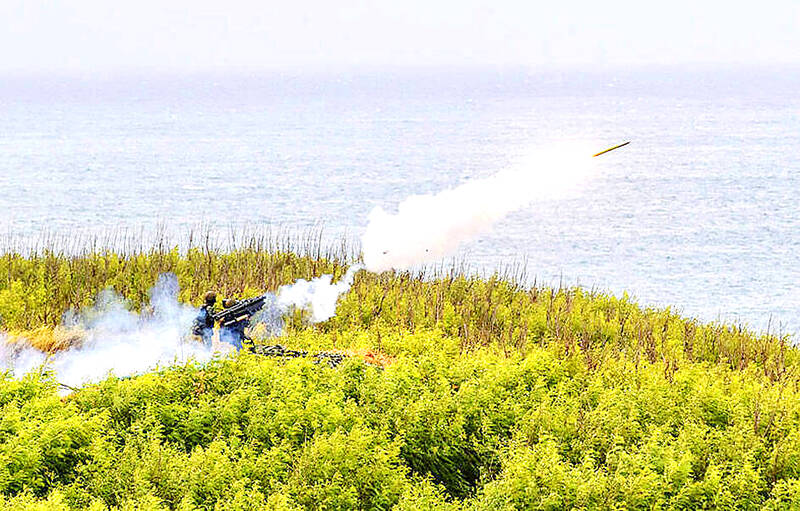Military conscripts starting their mandatory service this year would be training with drones and Stinger missiles during their eight-week basic training course, building a solid foundation for further specialized training in the next stage, the Executive Yuan’s administrative report issued this week said.
The report came on the heels of a Ministry of National Defense (MND) statement on Jan. 24 assuring the public that the first batch of conscripts serving a year of mandatory service after the program’s resumption on Jan. 1 last year would be adequately trained in all weapons platforms of note.
The statement was issued in response to a report by the Chinese-language Liberty Times (the Taipei Times’ sister paper) that said the army had only arranged for conscripts to train with Kestrel missiles — not Stinger or Javelin missiles as there was insufficient equipment or the equipment had not been delivered to the training bases.

Photo: Military News Agency via AP
The recruits were not trained to operate drones, the report added.
The ministry said that according to the Adjusted Plans to Strengthen National Defense Forces, some compulsory service members had been introduced to newer weapons platforms, including drones, last year.
It said it had also addressed issues where insufficient platforms resulted in fewer conscripts receiving such training than forecast, with the ministry ordering 400 additional Stinger missiles and the inauguration this month of its Uncrewed Aerial Vehicle (UAV) Training Center.
Dual-mount Stinger simulators — capable of training 12 people at a time — have been completed at the Chungshan Institute of Science and Technology, allowing soldiers and compulsory servicemen to be more familiar with the platform, it said.
Completing the first batch of compulsory service since the project’s resumption would help the military replenish its talent pool of non-commissioned officers, the ministry said.
The ministry estimated that about 1,800 conscripts, or about 30 percent of the total, have signed on for full-time service in the military.
Compulsory servicemen who completed their training today would boost the ranks of the reserve forces and help the government realize its whole-of-society defense policy, it said.
Army Lieutenant General Lee Jung-hua (李榮華), commander of the Tenth Field Army, on Wednesday visited the Chengkungling (成功嶺) camp to inspect equipment prepared for the training regimen.
The new equipment are highly efficient precision weapons that would test trainers’ ability not only to manage the equipment, but also teach conscripts how to operate it, Lee said.

Three batches of banana sauce imported from the Philippines were intercepted at the border after they were found to contain the banned industrial dye Orange G, the Food and Drug Administration (FDA) said yesterday. From today through Sept. 2 next year, all seasoning sauces from the Philippines are to be subject to the FDA’s strictest border inspection, meaning 100 percent testing for illegal dyes before entry is allowed, it said in a statement. Orange G is an industrial coloring agent that is not permitted for food use in Taiwan or internationally, said Cheng Wei-chih (鄭維智), head of the FDA’s Northern Center for

The Chinese military has built landing bridge ships designed to expand its amphibious options for a potential assault on Taiwan, but their combat effectiveness is limited due to their high vulnerability, a defense expert said in an analysis published on Monday. Shen Ming-shih (沈明室), a research fellow at the Institute for National Defense and Security Research, said that the deployment of such vessels as part of the Chinese People’s Liberation Army (PLA) Navy’s East Sea Fleet signals a strong focus on Taiwan. However, the ships are highly vulnerable to precision strikes, which means they could be destroyed before they achieve their intended

LOOKING NORTH: The base would enhance the military’s awareness of activities in the Bashi Channel, which China Coast Guard ships have been frequenting, an expert said The Philippine Navy on Thursday last week inaugurated a forward operating base in the country’s northern most province of Batanes, which at 185km from Taiwan would be strategically important in a military conflict in the Taiwan Strait. The Philippine Daily Inquirer quoted Northern Luzon Command Commander Lieutenant General Fernyl Buca as saying that the base in Mahatao would bolster the country’s northern defenses and response capabilities. The base is also a response to the “irregular presence this month of armed” of China Coast Guard vessels frequenting the Bashi Channel in the Luzon Strait just south of Taiwan, the paper reported, citing a

About 4.2 million tourist arrivals were recorded in the first half of this year, a 10 percent increase from the same period last year, the Tourism Administration said yesterday. The growth continues to be consistent, with the fourth quarter of this year expected to be the peak in Taiwan, the agency said, adding that it plans to promote Taiwan overseas via partnerships and major events. From January to June, 9.14 million international departures were recorded from Taiwan, an 11 percent increase from the same period last year, with 3.3 million headed for Japan, 1.52 million for China and 832,962 to South Korea,